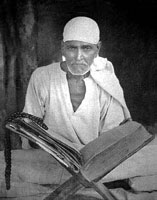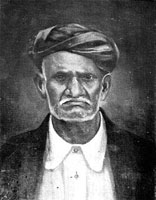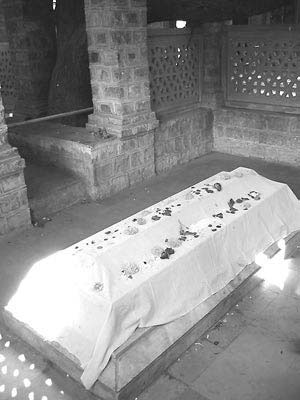 Just outside the southern fence of Lendi, across the square from Dixit Wada, is a row of five samadhis (tombs). Each is labelled with name and dates. The five people buried here include important Sai devotees. They are described below
Just outside the southern fence of Lendi, across the square from Dixit Wada, is a row of five samadhis (tombs). Each is labelled with name and dates. The five people buried here include important Sai devotees. They are described below
1. Abdul Baba (d.1954)
Abdul Baba came to Shirdi in 1889 or 1890 when he was around twenty. His parents, who were very poor, had given him into the care of a fakir. It is said that Baba appeared to the fakir in a dream, gave him two mangoes and asked him to send the boy to Shirdi. When the fakir woke up, what should he find beside him, but the two mangoes he had seen in his dream! He duly sent Abdul to Sai Baba, who greeted him with the curious words, "My crow has come."
Abdul Baba came to Shirdi in 1889 or 1890 when he was around twenty. His parents, who were very poor, had given him into the care of a fakir. It is said that Baba appeared to the fakir in a dream, gave him two mangoes and asked him to send the boy to Shirdi. When the fakir woke up, what should he find beside him, but the two mangoes he had seen in his dream! He duly sent Abdul to Sai Baba, who greeted him with the curious words, "My crow has come."

Abdul Baba was a dedicated worker: he cleaned the mosque, swept the streets outside it, kept the lamps burning in Lendi, washed Baba's clothes and collected water. Baba cared for Abdul like a father and took on the responsibility for his welfare. Abdul used to sit reading the Koran in the mosque, and Baba sometimes asked him to recite passages aloud. He kept a notebook in which he wrote down Baba's teachings and comments.
After Baba's mahasamadhi, for some time Abdul Baba occupied a room on the first floor of Booty Wada (the Samadhi Mandir). He continued to serve by maintaining the tomb and keeping it decorated with flowers. To this day, Abdul Baba's family members are continuing the tradition of offering flowers to the samadhi every morning.
2. Nanavalli (d.1918)
Nanavalli was a unique and intriguing Sai Baba devotee, who called himself the "General of Sai Baba's army". His background and history are shrouded in as much mystery as Sai Baba's, and he was notorious for his erratic and eccentric behaviour. Some people were afraid of this man - not only would he carry snakes in his pockets and scorpions in his mouth, but he would violently abuse and attack certain people for no apparent reason. Others felt him to be a mahatma, with an outstanding love for Sai Baba. His appearance was wild and dishevelled - sometimes he went naked and sometimes he dressed in old sacking. If we investigate the life of Nanavalli, we uncover a tale of touching and inspiring devotion, and a model of vairagya (dispassion).
Nanavalli was a unique and intriguing Sai Baba devotee, who called himself the "General of Sai Baba's army". His background and history are shrouded in as much mystery as Sai Baba's, and he was notorious for his erratic and eccentric behaviour. Some people were afraid of this man - not only would he carry snakes in his pockets and scorpions in his mouth, but he would violently abuse and attack certain people for no apparent reason. Others felt him to be a mahatma, with an outstanding love for Sai Baba. His appearance was wild and dishevelled - sometimes he went naked and sometimes he dressed in old sacking. If we investigate the life of Nanavalli, we uncover a tale of touching and inspiring devotion, and a model of vairagya (dispassion).
Accounts of Nanavalli's background vary. One says that he was a Brahmin by birth and another that he was born into a Muslim family. Some-times he wore the clothes of a Muslim fakir, and at others those of a Hindu sadhu. Thus again like Baba, his religious roots were ambiguous. However, both versions agree that as a small boy Nanavalli served in a Muslim dargah and came to attend Baba upon divine inspiration. Nobody knows when he came to Shirdi, but some say he was already there when Baba arrived with the wedding party. Upon seeing Baba, Nanavalli greeted him affectionately, "Oh, Uncle, you have come!" Thereafter, he always addressed Baba as "Mama" or Uncle.
Nanavalli was content to see Baba only occasionally and from a distance, but his emotion for Baba was such that he felt all glory and greatness should be Baba's and that none should accrue to himself. He used to say, "My duty is only to protect my uncle."
Nanavalli could not bear immorality or hypocrisy. He seemed to know devotees' inner thoughts and target them accordingly. He would sometimes wait outside Baba's mosque and beat up certain individuals. Though people would rush to Baba and complain, Baba would never reprimand Nanavalli, but simply warn them to be careful of him.
H. V. Sathe was a prominent devotee with a prestigious job in the colonial government. For some reason, he was particularly harassed by Nanavalli. During the Chavadi processions, Sathe had the privilege of carrying a sort of regal sceptre and walking in front of Baba. On one such occasion Nanavalli attacked Sathe on the back of the neck with a piece of broken glass. Another time, when Sathe was about to go to the mosque to worship Baba, his father-in-law rushed in and begged him not to, as Nanavalli was waiting there with an axe threatening to kill him. Sathe was so afraid that he fled Shirdi without seeing Baba or getting his permission to leave. That was in 1916 and he never came back to Shirdi again while Baba was alive.
As Sai Baba's fame grew, he was worshipped with increasing pomp and splendour. One day Nanavalli strolled into the mosque, which was crowded with visitors, and to the horror and mortification of those present, demanded of Baba, "Please get up. I want to sit there!" Baba immediately rose from his seat, saying, "Please sit." Nanavalli took his place. The devotees were appalled at his audacity and wanted to drag him away, but when they saw Baba's expression - calm and happy - they desisted. After a few moments Nanavalli exclaimed, "Shabash!" ("Good, well done!"), prostrated before Baba and danced ecstatically before leaving. Some say that Nanavalli wished to test the object of his adoration to see if any egoism had crept in, but others believe that he harboured no such doubts and simply wanted to demonstrate Baba's purity and detachment. Baba did not comment on the incident and none dared to ask him about it.
Nanavalli's attachment to Baba was so great that he used to say, "If Baba goes, I'll not be around for long." Sure enough, when Baba took Samadhi. Nanavalli rushed to Dwarkamai crying, "Uncle, without you how can I live? I am coming with you!" With that, he went to the Hanuman Mandir. There he wept grievously and took no food. Thirteen days later Nanavalli too passed away.
3. Bhau Maharaj Kumbhar (d.1928)
Bhau Maharaj was a much-loved devotee of Sai Baba, who came to Shirdi in the last two or three years of Baba's life. He was held in high esteem and many regarded him as an avadhut. He used to maintain silence, but his loving nature, cheerfulness and kindness to all creatures made him popular with everyone. Bhau Maharaj took it upon himself to sweep the streets of Shirdi; whenever he had money, he spent it on others. He usually wore only a koupina (loincloth) and if anyone gave him clothes, he would hang them on trees in order to "clothe" the trees or provide shade for animals. Similarly, if anyone offered him food, he would give it away. Until recently, when the area was paved, local people would sometimes take the earth from around his samadhi and mix it with castor oil as a general panacea for children.
Bhau Maharaj was a much-loved devotee of Sai Baba, who came to Shirdi in the last two or three years of Baba's life. He was held in high esteem and many regarded him as an avadhut. He used to maintain silence, but his loving nature, cheerfulness and kindness to all creatures made him popular with everyone. Bhau Maharaj took it upon himself to sweep the streets of Shirdi; whenever he had money, he spent it on others. He usually wore only a koupina (loincloth) and if anyone gave him clothes, he would hang them on trees in order to "clothe" the trees or provide shade for animals. Similarly, if anyone offered him food, he would give it away. Until recently, when the area was paved, local people would sometimes take the earth from around his samadhi and mix it with castor oil as a general panacea for children.
4. Tatya Kote Patil (d.1945)
Tatya Kote Patil occupies a special place in the history of Shirdi and Sai Baba, and many of his descendants are active in the local community. Sometimes referred to as Baba's "pet" devotee, Tatya had a unique relationship with the saint and was under his wing from the age of about seven. While most devotees were attracted to Baba because of his powers and what he could give them, Tatya related to Baba in a personal and human way.
Tatya Kote Patil occupies a special place in the history of Shirdi and Sai Baba, and many of his descendants are active in the local community. Sometimes referred to as Baba's "pet" devotee, Tatya had a unique relationship with the saint and was under his wing from the age of about seven. While most devotees were attracted to Baba because of his powers and what he could give them, Tatya related to Baba in a personal and human way.

Tatya's parents had been among the very first to recognize Baba's greatness, although Baba had the appearance of a fakir and, to many, seemed to be a madman. The moment Baba saw Bayajabai, Tatya's mother, he said, "She has been my sister for the last seven births." For her part, Bayajabai was immediately drawn to Baba, even before his powers or saintliness had been revealed. Having once met him, she would never eat without having first fed Sai. At that time Baba was roaming in the fields and every day Bayajabai would go and search for him, carrying food. Baba never forgot this service, and took loving care of her son. Later, when Baba was begging regularly for his food, the Patil's house was one of the five to which he usually went.
Bayajabai was Baba's "sister", and Baba loved her son like his nephew. As a child, Tatya addressed Baba as "Mama" or "Uncle" and they would play and romp together, with Tatya climbing on Baba's back and sitting in his lap. As Tatya grew up, the affection also deepened. Sometimes they wrestled together and played practical jokes. While Tatya was dozing, Baba might hide his towel, and then, in all innocence, pretend to help Tatya look for it. At other times, he would push the sleeping Tatya outside the mosque and gleefully wait for his reaction upon waking. Bleary-eyed, Tatya would wonder how he had got there. Sometimes he would twist Tatya's body into odd contortions. In return, Tatya, who was tall and stocky, would sometimes pick Baba up and run with him over his shoulder, with Baba yelling laughingly to put him down and go more slowly. Once he put his own turban and cloth on Baba and showed him his reflection in a mirror. Baba immediately began mimicking Tatya and teasing him.
Being so close to Baba, Tatya had various privileges that few, if any, shared. For example, only he and Mhalsapati were allowed to stay with Baba in the mosque at night. The three of them would lie like spokes on a wheel, with their feet touching. Baba would lie in the middle with his head pointing west. For fourteen years, Tatya slept like this until his father died and household responsibilities compelled him to be at home. When the chillim was taken out, Tatya would light it and take the first puff. Before the Chavadi procession, it was always Tatya who would come to the mosque and persuade Baba to move. Tatya was the only one whom Baba allowed to adorn him with expensive cloth for the occasion.
Sometimes Baba and Mhalsapati would massage Tatya's tired farmer's body, which upset Tatya as he felt it was inappropriate for Baba to do this service. Once, Tatya was so annoyed with Baba for doing this, that he kept away from Dwarkamai for several days. When Baba called out to him as he passed by the mosque, Tatya replied sulkily that he was not going to have anything to do with Baba! Later, Tatya was mollified by Kakasaheb Dixit and persuaded to come back to the mosque. Only Tatya treated Baba in this way.
Baba took care of Tatya's material welfare, giving him thirty-five rupees a day (a government employee's average salary was about this amount per month!) and instructing him to use it properly as capital and not to squander it. As a result, Tatya became a wealthy landowner and acquired a prominent social standing.
In 1916 Sai Baba privately predicted that Tatya would die two years later. At the time foretold, when Baba himself was ailing, Tatya fell seriously ill. One day, Baba summoned Tatya to the mosque. Tatya was so weak that he had to be carried. After feeding him a little milk-rice, Baba told him, "Tatya, at first I got two cradles ready for both of us, but now I've changed my mind. I don't want to take you now. I'm going alone. Go home!"
With that, he applied udi to the forehead of his beloved devotee, and watched for a long time as Tatya disappeared down the road. That was the last time Tatya saw his Gurudev alive: two days later Sai Baba passed away, while Tatya went on to recover and lived a further twenty-seven years. This has lead some people to believe that Sai Baba sacrificed his own life for Tatya's. Others, however, point out that such an exchange would not have been necessary for one of Baba's calibre - after all, he had saved lives before and even raised people from the dead. In Tatya Kote Patil's life with Baba, what stands out most is the immense and solid love and friendship between them. Its legacy provides us with both an inspiration and an aspiration.
5. V. P. Iyer (d.1945)
V. P. Iyer was the manager of a sugar-cane factory in Kopergaon. He did not see Sai Baba while Baba was in the body, but he was a staunch devotee who gave much service to the Sansthan and was popular with the villagers of Shirdi. He fell ill when visiting Shirdi and died holding Baba's picture and saying his name. It was his desire to be buried here.


No comments:
Post a Comment